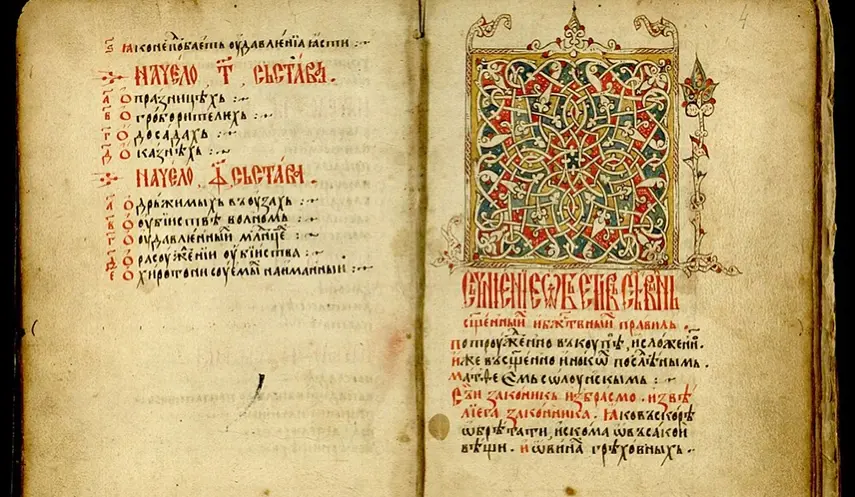DUŠAN'S CODE BROUGHT ORDER TO THE MEDIEVAL STATE
Serbia - the Nemanjić dynasty - anniversary
08/30/2025
11:34

BIJELJINA, AUGUST 30 /SRNA/ - Dušan's Code, the most important and strictest legal code of the Serbian medieval state, whose famous motto was "An eye for an eye, a tooth for a tooth," was enacted on August 31, 1349.
The only member of the holy Serbian Nemanjić dynasty who was not canonized as a saint, and the first Serbian emperor, Stefan Uroš IV Dušan Nemanjić, also known as Dušan the Mighty, was the greatest ruler of Serbia. During his reign, the borders of Serbia included territories that today belong to eight Balkan countries.
During his reign, the penultimate ruler of the Nemanjić dynasty strengthened his authority with robust legislation, the pinnacle of which was Dušan’s Code.
Dušan began work on the Code in 1346, immediately after his coronation as emperor, and to this day, 24 copies of the Code are known to exist.
This most important law of medieval Serbia was enacted at an assembly of the nobility and high-ranking church officials on May 21, 1349, in Skopje, and later supplemented on August 31, 1354, in Serres. The revised edition comprised 201 articles.
The Code was based on the foundations of Saint Sava’s Zakonopravilo /Krmčija or Nomocanon/, to which Dušan refers directly in certain sections. In addition, parts of the Code drew upon Byzantine law.
The Code was adopted to regulate the Serbian state with laws that would apply throughout the entire empire and to all its subjects.
Although Dušan’s Code is remembered as very strict, historical records indicate that such measures contributed to a reduction in offenses in medieval Serbia and a decline in crime during the time of the Serbian Empire.
The Code regulated some of the most common offenses, such as theft, adultery, and violations of reputation and honor, and, in addition to provisions of a constitutional nature, it also regulated the rights of social classes, protecting even the lowest strata. It included criminal and procedural provisions, as well as rules concerning family and inheritance law.
What is particularly distinctive about this imperial act is that, besides secular offenses, it also addressed spiritual matters.
Among the first matters regulated by the Code were marital relations. Articles Two and Three of this Code state that no one may marry without the blessing of their spiritual advisor, and if they do, “they shall be separated.”
The law regulated not only marital but also sexual relations, and even “immoral or illicit sexual activity between spouses” was punishable.
"If a noblewoman commits sexual immorality with her man, both their hands shall be cut off and their noses severed," the Code states.
Under Dušan's Code, rapists and pedophiles were punished as follows: "If a nobleman takes a noblewoman by force, both his hands shall be cut off and his nose severed; if a commoner takes a noblewoman by force, he shall be hanged; if he takes the wife of another commoner by force, both his hands shall be cut off and his nose severed."
Lies, bribery, and slander were also considered serious offenses. Falsifying documents was punished by confiscating what one tried to conceal. For accepting a bribe, all property was confiscated, and a slanderer was equated with a robber.
Cursing was punished with a fine. Article 55 states: "If a nobleman or a young nobleman curses a commoner, he shall pay one hundred perpera, and if a commoner curses a nobleman or young nobleman, he shall pay one hundred perpera and be scorched lightly."
During the reign of Tsar Dušan, offenses committed under the influence of intoxicating drinks were punished by blinding, flogging, or amputation of limbs.
The principle of “an eye for an eye, a tooth for a tooth” is most clearly reflected in the penalties for the most atrocious killings.
The punishment for murderers was death; however, if the victim was a close relative, the penalty was even harsher. “Whoever kills a father, mother, brother, or their own child, such a murderer shall be burned at the stake,” the Code states.
If someone killed a clergyman, they could be executed by hanging.
In commemoration of the adoption of Dušan’s Code, Serbia observes May 21 as Judiciary Day.

DODIK: MEETING WITH USHAKOV CONFIRMS THAT SRPSKA IS WRITING ITS OWN FUTURE – SRPSKA WILL PREVAIL!

ŠOLAJA: ABSOLUTE SUPPORT FOR THE PRESIDENT OF SRPSKA AND THE REFERENDUM

KALUŽA: IMPORTANT MESSAGES FROM LAVROV



